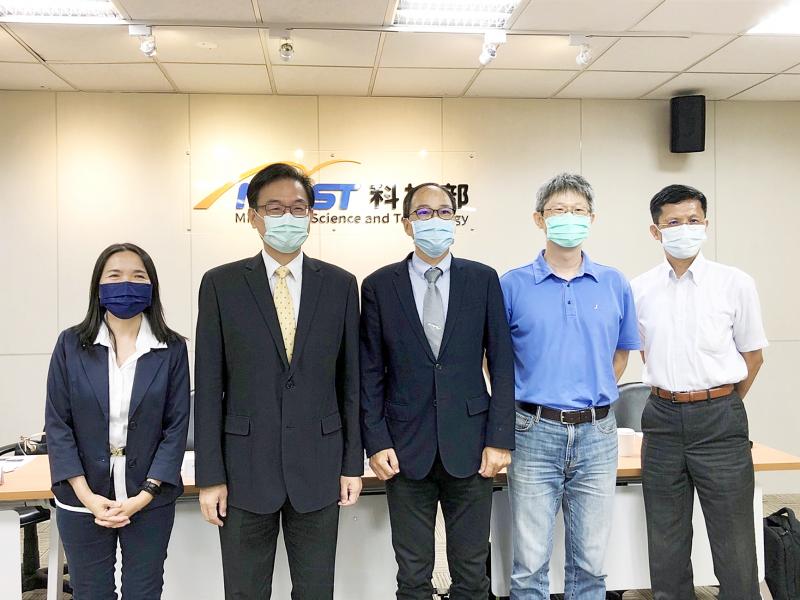National Taiwan University (NTU) researchers are working on a project to improve hog farming efficiency, hoping to help farmers eradicate odor pollution, the team said yesterday.
The nation’s hog farming industry generates annual revenues of at least NT$70 billion (US$2.49 billion) and the quality of local pork is widely considered good, Stone Ding (丁詩同), a professor in NTU’s Department of Animal Science and Technology, told a news conference in Taipei.
However, environmental pollution remains a major concern, he said.

Photo: CNA
To promote the application of technology in farming, the Ministry of Science and Technology in 2018 launched a program with NT$2 billion in funding over four years, said Ding, a former deputy executive secretary of Executive Yuan’s Board of Science and Technology.
As part of the project, the team of nine professors is seeking to help farmers reduce waste and pollution, Ding said.
Microbiological research, and information and communications technology tools play key roles in solving the problems, he said.
To make pig excrement less smelly, the team added cinnamaldehyde, an organic compound that gives cinnamon its smell, and essential oils to pig feed, and found that the additives improved the animals’ digestion and minimized the production of ammonia, a byproduct of their protein metabolism, Ding said.
The researchers also developed precision microbial agents as feed supplements, which were found to accelerate the animals’ growth, while reducing bad gut microbiota, such as Clostridium perfringens, he said.
It usually takes six months for a pig to grow to 110kg or 120kg, when it is sent to the slaughterhouse, said Chen Ming-ju (陳明汝), another professor at the department.
Pigs fed with the microbial agents grew to that weight two weeks faster than expected, she said.
Saving farmers two weeks of pork feed, the additives would help them farm more efficiently, Chen said.
The team also developed a system, featuring mobile sensors and cameras to be installed in pig pens, to collect data on carbon dioxide, ammonia and hydrogen sulfide, which cause foul smell, as well as data on airborne particulate matter, temperature and humidity.
With the image recognition tools, farmers can remotely monitor the pigs’ movements around the clock, estimate their growth and adjust their feed supply when necessary, he said.
The team also developed smart wastewater disposal and methane desulfuration systems equipped with remote monitoring tools, he said.
These tools can also reduce human interference where transmissions of disease might occur, Ding said.
The techniques have been tested at three farms with nearly 3,000 pigs in total, Ding said, hoping to promote the tools to more farms nationwide.

An essay competition jointly organized by a local writing society and a publisher affiliated with the Chinese Communist Party (CCP) might have contravened the Act Governing Relations Between the People of the Taiwan Area and the Mainland Area (臺灣地區與大陸地區人民關係條例), the Mainland Affairs Council (MAC) said on Thursday. “In this case, the partner organization is clearly an agency under the CCP’s Fujian Provincial Committee,” MAC Deputy Minister and spokesperson Liang Wen-chieh (梁文傑) said at a news briefing in Taipei. “It also involves bringing Taiwanese students to China with all-expenses-paid arrangements to attend award ceremonies and camps,” Liang said. Those two “characteristics” are typically sufficient

A magnitude 5.9 earthquake that struck about 33km off the coast of Hualien City was the "main shock" in a series of quakes in the area, with aftershocks expected over the next three days, the Central Weather Administration (CWA) said yesterday. Prior to the magnitude 5.9 quake shaking most of Taiwan at 6:53pm yesterday, six other earthquakes stronger than a magnitude of 4, starting with a magnitude 5.5 quake at 6:09pm, occurred in the area. CWA Seismological Center Director Wu Chien-fu (吳健富) confirmed that the quakes were all part of the same series and that the magnitude 5.5 temblor was

The brilliant blue waters, thick foliage and bucolic atmosphere on this seemingly idyllic archipelago deep in the Pacific Ocean belie the key role it now plays in a titanic geopolitical struggle. Palau is again on the front line as China, and the US and its allies prepare their forces in an intensifying contest for control over the Asia-Pacific region. The democratic nation of just 17,000 people hosts US-controlled airstrips and soon-to-be-completed radar installations that the US military describes as “critical” to monitoring vast swathes of water and airspace. It is also a key piece of the second island chain, a string of

The Central Weather Administration has issued a heat alert for southeastern Taiwan, warning of temperatures as high as 36°C today, while alerting some coastal areas of strong winds later in the day. Kaohsiung’s Neimen District (內門) and Pingtung County’s Neipu Township (內埔) are under an orange heat alert, which warns of temperatures as high as 36°C for three consecutive days, the CWA said, citing southwest winds. The heat would also extend to Tainan’s Nansi (楠西) and Yujing (玉井) districts, as well as Pingtung’s Gaoshu (高樹), Yanpu (鹽埔) and Majia (瑪家) townships, it said, forecasting highs of up to 36°C in those areas